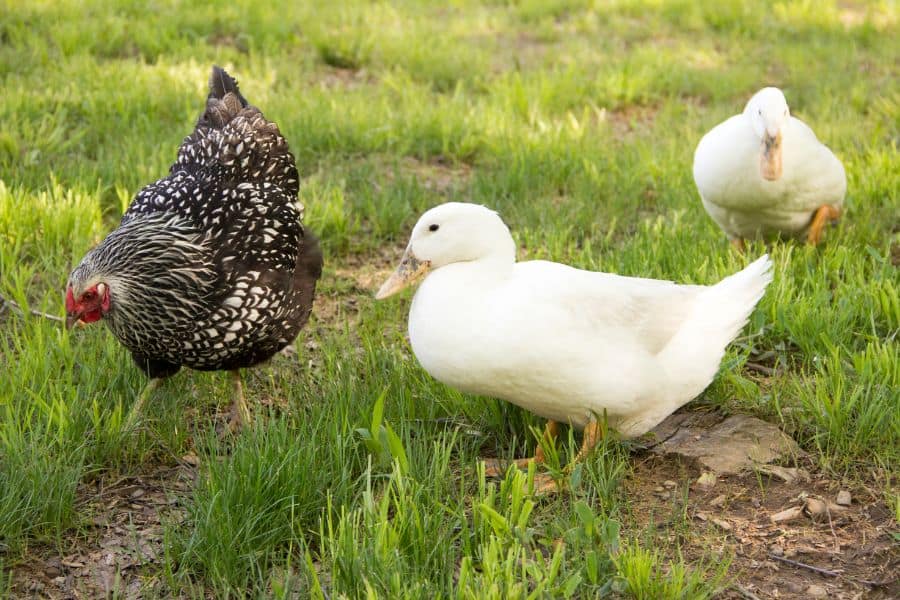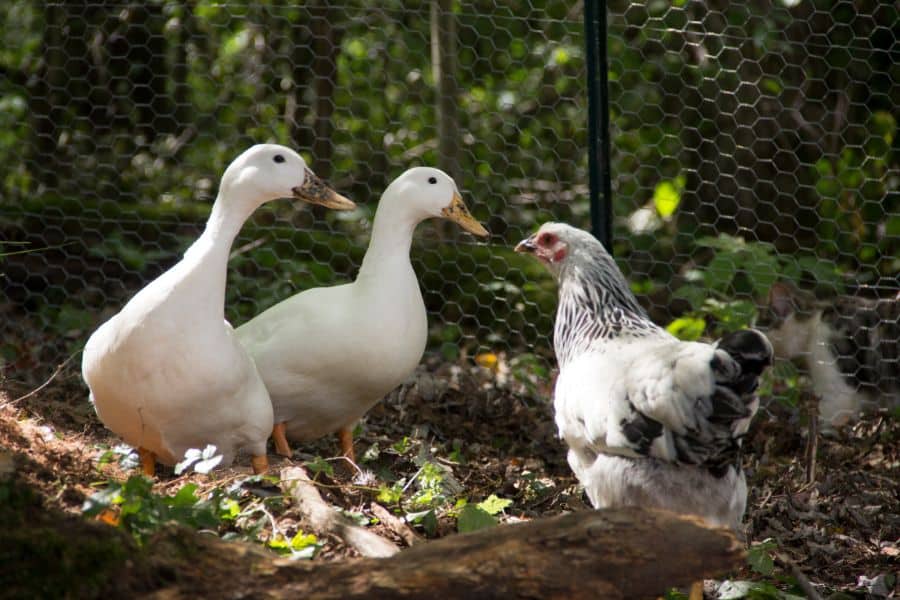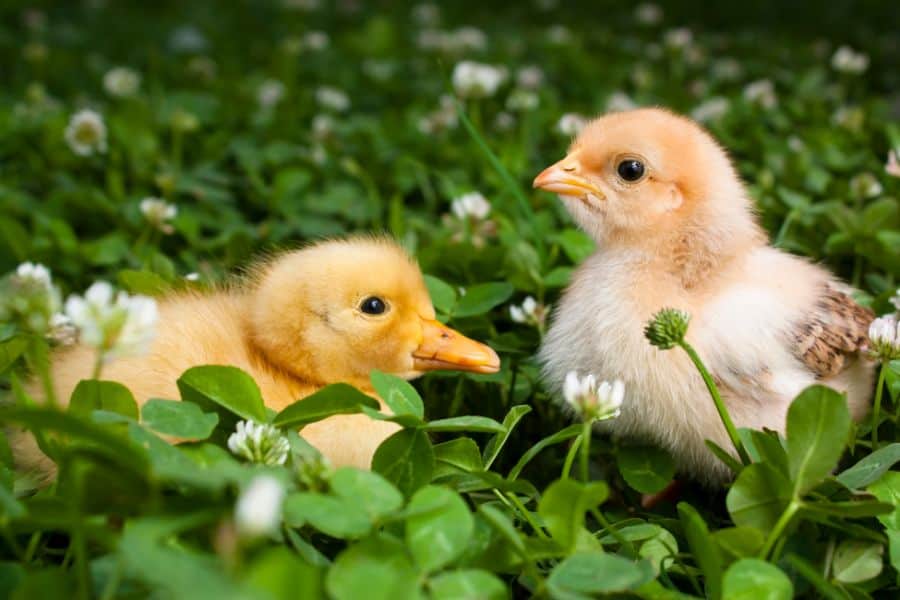If you enjoy the thrill of raising chickens, chances are, the idea of adding ducks to your backyard flocks has crossed your mind before.
But probably you held that thought back because you didn’t know if ducks and chickens can live together. Right?
We are happy to inform you can raise these domesticated birds together. They can consume the same feeds and treats, sleep together, and even form strong friendship bonds.
But before you venture into this new project, there are some caveats you must follow to ensure a happy, healthy, and peaceful co-existence between your feathery friends.
Can Ducks and Chickens Live Together?
While raising ducks and chickens is possible, each bird has distinct needs and requirements. But once you’ve recognized and understood them, you can ensure their well-being and happiness.
Ducks are intelligent and entertaining little creatures with complex social relationships. This is one of the reasons raising ducks is so exciting and rewarding.
On the other hand, chickens thrive in small groups built around a clear hierarchy. For most of their life, they are busy creatures, always exploring, foraging, resting, and dust bathing.
Generally, ducks and chickens are viewed as acquaintances rather than friends, but they have no problem intermingling and sharing the same living spaces.
However, ducks and chickens will mostly hang around their kind, unless the ducks were raised by a chicken from a young age. Don’t be surprised that chickens can also raise ducklings!
Ducklings usually imprint on their caretaker a few hours after hatching. If the hen mother is the primary caregiver, the ducklings will adopt her behavior.
For some time, the ducks will grow up believing they are part of the chicken brood. But as they mature, their inherent nature will emerge, and they might start pulling away from their chicken companions.
Ducks and chickens squabble just as they do amongst themselves. However, ducks’ disagreements don’t last long, unless it involves drakes fighting for mates. On the contrary, chickens tend to be more aggressive towards members of their species and other domesticated birds.
Factors To Consider When Raising Ducks and Chickens Together
Picture this scenery: Stunning ducks bobbing their heads up and down, quacking repeatedly, or playing in your water pond. And while at it, there are some colorful chickens pecking elegantly around. Just charming and perfect! That’s the dream, right?
Well, if you are considering raising chickens and ducks together, here are a few things to consider before starting your thrilling journey.
1. Space
One important aspect to consider when creating a harmonious home for ducks and chickens is the availability of space and freedom to range.
This crucial factor nurtures tolerance between the birds, plus allows them to be themselves without feeling intimidated or invading each other’s boundaries. Furthermore, sufficient space gives each species the advantage of escaping with ease when things get heated.
Skimping on space can lead to irritability, bullying, and stress and may lead to health issues.
Related: How Much Space Do Chickens Need?
2. Ideal Coop
You can house chickens and ducks in the same coop as long as you create a safe and comfortable environment for them.
However, there are a few nitty-gritty preferences you might need to note when it comes to housing. For instance, chickens enjoy roosting at night, while their counterparts often nest on the ground.
For the well-being of these birds, the ideal shade should have distinct areas for roosting and nesting and ensure their comfort and safety.
We will still cover more information on housing considerations later in the article, so keep on reading.
3. Diet
Ducks and chickens might eat the same food, but they have a few distinct dietary requirements. And if you don’t understand them, raising these bird species together might prove challenging.
Case in point, ducks require more niacin or vitamin B3 than chickens because they can’t get it from tryptophan.
4. Water Requirements
Perhaps the biggest problem you’ll have when raising chickens and ducks is water requirements. Chickens primarily require water to quench their thirst and aid digestion. Beyond that, water holds little significance to them, considering they don’t like to swim.
But for ducks, water is everything. They don’t just love it; they need it!
These birds need water to drink, bathe, and swim in. The longest ducks could go without water is around 8 hours. But even a few hours without water access could have serious health effects on the ducks.
Interestingly, if ducks don’t get into the water, their preen gland stops working, making them lack enough oil to keep their feathers waterproof. The condition known as wet feather often leads to frostbite, chill, and drowning in ducks.
Now, it’s clear why it’s crucial to provide separate water sources for both birds and accommodate their unique water requirements.
5. Common Health Issues
Birds, ducks, and chickens might fall victim to several common poultry diseases, including:
- Fowl pox
- Newcastle disease
- Infectious bronchitis
- Avian influenza
- Infectious Coryza and so on…
But keep in mind that certain health conditions are unique to each bird species. So, before introducing ducks to your flock, we urge you to familiarize yourself with these diseases or illnesses.
Other ways you can ensure the safety of your ducks and chickens include:
- Providing clean water
- Maintaining a clean and dry shelter
- Preventing contact with wild birds
- Establishing quarantine space for new flock member
- Providing a balanced diet
- Immunization
- Reducing environmental stressors
6. Mating Season Considerations
Another concern when it comes to keeping ducks and chickens is mating. The mating season is characterized by aggression in both bird species. This in turn leads to increased cases of bullying and biting among flock members.
Let’s not forget the roosters and drakes will be busy chasing hens. While a duck and chicken cannot mate, it’s no surprise to see a rooster trying to impregnate a female duck and vice versa.
But just because they cannot mate, it doesn’t mean the drakes will not try. You don’t want this because the male ducks can cause harm or even kill your hens.
The solution to this problem is to have enough females for your roosters and drakes.
Also Read: Are Ducks Good Pets?
Advantages And Disadvantages of Raising Ducks and Chickens Together
Advantages
- Companionship – Although not best friends, ducks and chickens can live peacefully together and offer each other companionship.
- Nutrient-Rich Manure – The droppings from ducks and chickens are rich sources of nutrients such as nitrogen and phosphorous for your garden.
- Pest Control– Chickens hunt for worms, insects, and larvae, while ducks hunt for snails and other pests, leaving your property pest-free.
- Predator protection – Ducks are excellent watchdogs and provide a warning when predators are around.
Disadvantages
- Housing considerations – Ducks prefer nesting on the ground, and chickens like roosting at night. Hence, separate or partitioned coops are necessary to ensure comfort and well-being.
- Different water needs – Water is probably your largest frustration when raising chicken ducks in the same coop. Ducks require lots of water to remain healthy. They also like playing with water, which makes their environment damp. Such an environment is not ideal for chickens as it predisposes them to infections.
- Flock dynamics – While your mixed flock may integrate, ducks prefer the company of other ducks, and so do chickens. Sometimes, tensions occur, especially during the mating season, causing aggression and possible physical harm.
Can Ducks and Chickens Share a Coop?
Ducks and chickens can share the same shelter but with some adjustments. Chickens prefer dry, warm, and cool coop. The structure should also be well-insulated, ventilated, and equipped with nesting boxes. Remember, chickens also roost in high places, so they need perches.
Unlike chickens, ducks are typically a hard bird species. They just require a simple shade that can protect them from harsh elements and predators.
However, if they have to share a house with chickens, some changes will be necessary. Since ducks love sleeping on the ground, they need floor-level nesting spots. Just ensure you don’t position them under the roost because they will get pooped on.
Another thing to note, ducks are the chatty type. They might make loud noises at night that might disturb the chicken’s sleeping pattern.
What about ramps? When adding them, be sure they are not too steep for the ducks. While chickens can navigate a steep ramp effortlessly, the ducks’ floppy and webbed feet make it hard to climb such ramps.
When designing a shade for a mixed flock, remember to include a small predator-proof door that stays open at night. The door could lead to a run or a secure space. The reason for this is that ducks love dozing off under the embrace of outdoor air and dark sky.
Proper coop ventilation and moisture control are also crucial. Ducks love water and often create a damp environment that can harm the flock if not correctly managed. Similarly, mixed flocks generate lots of water vapor from breathing and their droppings, which makes the coop humid.
A damp coop is a recipe for disaster. First off, it creates a perfect environment for disease-causing bacteria and pathogens to thrive. It also makes the flock prone to frostbite and respiratory illnesses.
Luckily, installing vents near the coop’s roof or under eaves can allow water vapor to escape. This way, your poultry house will remain dry, warm, and odor-free.
Lastly, no matter the coop’s design, do not overcrowd it. Overcrowding makes your flock irritable, causing issues like bullying. So, allocate each chicken or duck with at least three square feet of floor space.
Do Ducks and Chickens Eat the Same Food?
While ducks and chickens can feed on the same food, there are a few dietary needs to consider.
A mixed flock of adult ducks and chickens can feed on regular layer chicken feeds and also do well when allowed to free range. Both species can self-regulate how much they eat. Therefore, you can leave food in the feeder since they are unlikely to overfeed.
However, you must choose suitable foods for both species, such as non-medicated layer feed for ducks. You should also provide separate feeding stations to reduce competition and allow both flocks to access the food comfortably. Remember that duck bills cannot fit well into the regular chicken feeder.
Also, ducks, especially ducklings, require additional Vitamin B3 for overall growth. Without niacin, ducklings may develop neurological problems and other health issues.
To avoid this, supplement their diet with niacin-rich food like peas, water-packed tuna fish, feed fish, pumpkin, and nutritional yeast.
Lastly, both bird species deserve some treats and snacks, such as fruits, vegetables, and leafy greens.
Can Ducks Protect Chickens?
Ducks make excellent guardians for a small flock of chickens. Sure! These birds might not have protective qualities like geese, but they can still help keep your girls safe.
Despite their friendly and calm disposition, drakes are territorial and can scare away predators. Even if they don’t fight the intruders, they can quack loudly and flap their wings to alert their owners.
Once ducks spot danger, they make loud noises that send other flock members into hiding until the threat passes.
But don’t place all your hopes on them. You should still implement better protective measures to keep your mixed flock safe. That could include erecting a fence, setting up motion detectors, and using noise deterrents.
Can You Keep Baby Ducks and Chicks Together?
If you plan to raise ducklings and chicks together, use separate brooders to accommodate their distinctive needs.
Ducks and ducklings are messy and like wet environments, whereas chicks like dry settings. If you raise chicks in damp areas, they are prone to brooder pneumonia and other health issues.
Besides, ducklings require special nutrition requirements, plus additional niacin for overall health and well-being.
Also, do not feed them medicated chick food, as it’s toxic to their body.
Takeaway
Keeping ducks and chickens together can be an inspiring adventure as long as you meet their needs. Also, you should be ready to make a few adjustments to ensure peaceful co-existence between the two bird species.
At first, it would not be easy, as your chickens might not accept the ducks. But as time goes by and the birds get used to each other, you will feel happy knowing you made the right decision.
When raised together, the birds will have several perks, including protection and companionship. As a farmer, you will enjoy nutrient-rich manure, constant egg supply, and garden pest control.
As you can see, it is a win-win situation for the birds and their owners.
Hopefully, we have given you all the information you require to start raising ducks with your chickens!



